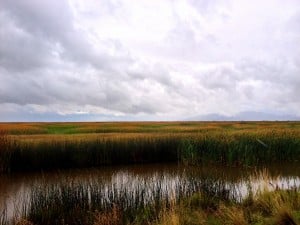 “Please, let us be protectors of creation, protectors of God’s plan inscribed in nature, protectors of one another and of the environment.”
“Please, let us be protectors of creation, protectors of God’s plan inscribed in nature, protectors of one another and of the environment.”
At first glance this is a counterintuitive statement. How might concern for the poor and for the environment be linked? Aren’t they often mutually exclusive? Aren’t humanitarians and tree-huggers loving different things? Can we be both Mother Teresa and St. Francis of Assisi? Pope Francis obviously seems to think so. Of course, this really is not new Christian doctrine. They are linked by a very basic and fundamental concern for the vulnerable and by the theology of protecting the imprint of God wherever we might find it, whether it is in the face of the other or in the fabric of creation itself. Love of humanity and love of the earth are not just different manifestations of our human need for affection; when twinned together, they are expressions of the same love that emanates from God.
It is only new to our ears because of how religious culture over the previous half century or so became increasingly divorced from concerns about the environment and focused almost exclusively on human social ethics. At least here in America, the post-World War II optimism about the limitless possibilities of economic growth and technology bit us hard, so hard that most religions, even after long traditions of caring for the environment, almost seemed to think the environment could be cast aside as a minor, if not disruptive concern. We wanted to believe that our creation in the image of God somehow set us so radically apart from the rest of the Creation that our ethical concerns should be directed merely toward human ends.
It has taken the work of many environmentally concerned theologians within Christianity and across the world’s religions to wake us up to a different and older way of thinking. Folks like the Evangelical Environmental Network and statements from Pope John Paul II and now Pope Francis remind us that Christianity is fundamentally concerned with proper care of the Creation and that we must not sacrifice the well-being of the planet at the expense of human well-being. Indeed, we cannot do so. To be dismissive of concerns for the planet is also to dismiss the status of the poorest of the poor, since any measure of the effects of pollution, toxic waste, and climate change will show a disproportionate effect on the most vulnerable. It is also to be dismissive of future generations, an attitude that can hardly be considered humanitarian.
We Mormons are a bit slow to catch up to this growing awareness among people of faith about the need to care for creation. But we certainly have no doctrinal excuses. Pope Francis says Christian duty is to:
“the whole of humanity, especially the poorest, the weakest, the least important, those whom Matthew lists in the final judgment on love: the hungry, the thirsty, the stranger, the naked, the sick and those in prison.”
“Today, amid so much darkness we need to see the light of hope and to be men and women who bring hope to others,” he said. “To protect creation, to protect every man and every woman, to look upon them with tenderness and love, is to open up a horizon of hope. It is to let a shaft of light break through the heavy clouds.”
As a Christian of a different faith, I nevertheless strongly agree with this theology. I have expressed my own LDS perspective on the link between poverty and climate change and have expressed admiration for other Christian responses to our environmental crisis. I believe that King Benjamin stated our responsibilities clearly. As my fellow LDS blogger Laura writes in urging us to care about air quality: “One of our most cherished values as a people is our concern for the less fortunate. King Benjamin taught his people to show extra care for those in need—the poor, the sick—a charge that hasn’t been rescinded. I believe that doing what we can to make sure everyone has access to clean air is an important part of discharging our duty to care for the less fortunate.”
In short, we are to be answerable to the well-being of those less fortunate than ourselves. And we cannot afford any longer to imagine that our choices of consumption, transportation, or that our very way of life are not connected to this earth or have no impact on our neighbors near and far. This was the seductive dream of limitless freedom from which it is high time we awake.











